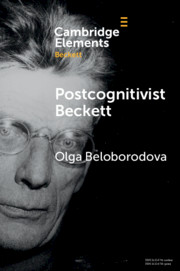Element contents
Postcognitivist Beckett
Published online by Cambridge University Press: 04 May 2020
Summary
Information
- Type
- Element
- Information
- Series: Elements in Beckett StudiesOnline ISBN: 9781108771108Publisher: Cambridge University PressPrint publication: 04 June 2020
References
Accessibility standard: Unknown
Why this information is here
This section outlines the accessibility features of this content - including support for screen readers, full keyboard navigation and high-contrast display options. This may not be relevant for you.Accessibility Information
- 18
- Cited by
